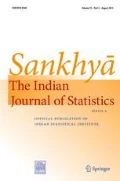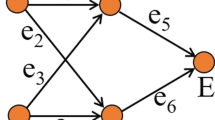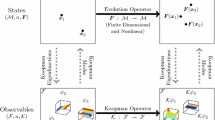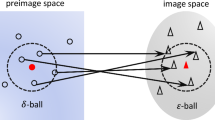Abstract
A multi-state coherent system consists of multiple components each of which passes through a sequence of states and it is of interest to estimate the distribution of time spent by the components in different states. Although not practical, for mathematical convenience, it is usually assumed that the times spent by the components in various states are independent of each other. This paper considers three-state series and parallel systems and is based on the assumption that times spent by the components in various states are positively quadrant dependent (PQD) and the corresponding dependence is modeled using a Farlie Gumbel Morgenstern (FGM) distribution. To begin with it is shown that even when marginal distributions are assumed exponential, the resulting likelihood function leads to a complicated expression making maximum likelihood (ML) based inference computationally challenging. A generalized method of moment (GMM) estimation is shown to be relatively simpler not only computationally but also the method works for arbitrary marginal distributions. The estimates obtained by GMM are shown to be uniformly consistent under some mild regularity conditions. Finite sample performances of the ML and GMM are illustrated using FGM distribution with various parametric marginal distributions. In case of exponential marginals, it is shown that GMM compares favorably to ML although the former method does not require parametric assumption for the marginals. The proposed methods are also illustrated using a real case study data of a rare type of head and neck cancer.

Similar content being viewed by others
References
Jogesh, B.G. and Rao, C.R. (2004). Goodness of fit tests when parameters are estimated. Sankhya 66, 63–74.
Bekrizadeh, H., Parham, G.A. and Zadkarmi, M. R (2012). The new generalization of Farlie-Gumbel-Morgenstern Copulas. Appl. Math. Sci. 71, 3527–3533.
Billingsley, P. (1999). Convergence of probability measures, 2nd edn. Wiley, New York.
Cebrian, A., Denuit, M. and Scaillet, O. (2004). Testing for concordance ordering. Astin Bull. 34, 151–173.
Conway, D. (1983). The Farlie-Gumbel-Morgenstern distributions, encyclopedia of statistical sciences, 3. Wiley, New York, Johnson, N. and Kotz, S. (eds.), p. 28–31.
Denuit, M. and Scaillet, O. (2004). Non parametric tests for positive quadrant dependence. J. Financ. Econom. 2, 422–450.
Dvoretzky, A., Kiefer, J. and Wolfowitz, J. (1956). Asymptotic minimax character of the sample distribution function and of the classical multinomial estimator. Ann. Math. Statist. 27, 642–669.
Joe, H. (2014). - Dependence modeling with copulas. Chapman & Hall/CRC Press, New York.
Lai, C.-D. and Xie, M. (2006). Stochastic ageing and dependence for reliability. Springer, Berlin.
Lisnianski, A. and Levitin, G. (2003). Multi-State System reliability assessment optimization and applications. World Scientific, Singapore.
Lisnianski, A., Frenkel, I. and Ding, Y. (2010). Multi-State System reliability analysis and optimization for engineers and industrial managers. Springer, New-York.
Natvig, B. (2010). Multistate systems reliability theory and applications, Wiley Series in Probability and Statistics, UK.
Peacock, J.A. (1983). Two-dimensional goodness-of-fit in astronomy. Mon. Not. R. Astr. Soc. 202, 615–627.
Scaillet, O. (2005). A Kolmogorov-Smirnov type test for positive quadrant dependence. Canad. J. Statist. 33, 415–427.
Silverman, B. (1978). Weak and strong uniform consistency of the kernel estimate of a density and its derivatives. Ann. Stat. 6, 177–184.
Silverman, B.W. (1986). Density estimation for statistics and data analysis. Chapman and Hall, London.
Press, W.H., Teukolsky, S.A., Vetterling, W.T. and Flannery, B.P. (2002). Numerical recipes in c++: the art of scientific computing, 2nd edn. Cambridge University Press, Cambridge.
Zhu, C., Byrd, R.H., Lu, P. and Nocedal, J. (1997). L-BFGS-b: Algorithm 778: l-BFGS-b, FORTRAN routines for large scale bound constrained optimization. ACM Trans. Math. Softw. 23, 550–560.
Acknowledgement
The authors would like to thank Dr. Atanu Bhattacharjee, Advanced Centre for Treatment, Research & Education in Cancer (ACTREC), Tata Memorial Centre, Navi Mumbai, India, for making available the real life data. The authors will like to thank the associate editor and the anonymous referee for their valuable suggestions which led to a more streamlined version of an earlier manuscript.
Author information
Authors and Affiliations
Corresponding author
Additional information
Publisher’s Note
Springer Nature remains neutral with regard to jurisdictional claims in published maps and institutional affiliations.
Rights and permissions
About this article
Cite this article
Kulkarni, L., Sabnis, S. & Ghosh, S.K. Parameter Estimation for Multi-state Coherent Series and Parallel Systems with Positively Quadrant Dependent Models. Sankhya A 84, 714–742 (2022). https://doi.org/10.1007/s13171-020-00217-0
Received:
Published:
Issue Date:
DOI: https://doi.org/10.1007/s13171-020-00217-0
Keywords
- Multi-state series system
- Generalized method of moments
- Maximum likelihood estimation
- Positively quadrant dependent
- Farlie-Gumbel-Morgenstern distribution




